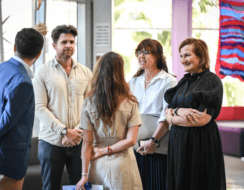01 Oct 2015
NewsVIDEO: SSI awarded for mental health approach
{youtube}https://www.youtube.com/watch?v=CGL-aAxMjZE&feature=youtu.be{/youtube}
The awards were presented at Parliament House to recognise the outstanding efforts of individuals and organisations who improve understanding, awareness and service provision of mental health in NSW. The ceremony also marked the beginning of Mental Health Month, which aims to heighten awareness and promote discussion about mental heath in the broader community.
Accepting the award on behalf of SSI, SSI Manager of Humanitarian Services David Keegan explained that mental health was particularly prevalent among refugees and people seeing asylum, and yet awareness of symptoms and treatment options was lagging.
“The clients we work with experience very high rates of depression and anxiety for a multitude of reasons such as exposure to war and torture, financial hardship and unemployment, and issues such as racism,” Mr Keegan said. “The stress of transitioning to life in a new country can also have complex effects on mental health, which heightens the need for these individuals to have access to culturally appropriate support networks.”
Mr Keegan explained that recent efforts to upskill staff and refine SSI’s screening process were delivering significant results, with client referral rates more than doubling since the implementation of a specialised Refugee Health Screening tool (RHS-15) in August 2014.
“Mental health has so often been viewed as a dirty word, but training and improved screening tools have helped to facilitate greater awareness of mental illness and to create opportunities for caseworkers to discuss emotional needs with their clients in a more positive way,” Mr Keegan said.
Of 7,500 client screening assessments completed in the past 13 months, 35 per cent were identified as requiring referral to counselling services. SSI clients were also found to experience psychological distress at up to four times the rate of the general Australian population for reasons including grief, loss and separation from family, and uncertainty surrounding visa status. Unfortunately, however, only a third of these clients consented to a referral to professional support due to stigma and denial.
“It is normal for any new migrant to experience emotional challenges when making a new life in a new country yet mental wellbeing is not well understood in many migrant communities,” Mr Keegan said. “SSI plays an important role in assisting refugees and asylum seekers to make both physical and psychological adjustments and to combat stigma which remains a significant barrier for people seeking treatment.”
SSI Humanitarian Settlement Services (HSS) Service Delivery Manager Yamamah Agha added that many case managers at SSI come from a refugee background themselves and can sometimes bring with them limited knowledge and particular cultural biases about mental illness.
“SSI case managers receive extensive training on how to assess and refer individuals for treatment, and by continuously evolving and improving these procedures, we can bring mental health into the daily dialogue, break down stigmatisms surrounding mental health, and support our clients towards happier, healthier lives,” Ms Agha said.
This has led to the development of a range of partnerships with mental health experts, such as academics at the University of NSW (UNSW) and beyondblue, with a view to developing resources to help refugees to better understand their mental wellbeing needs.


